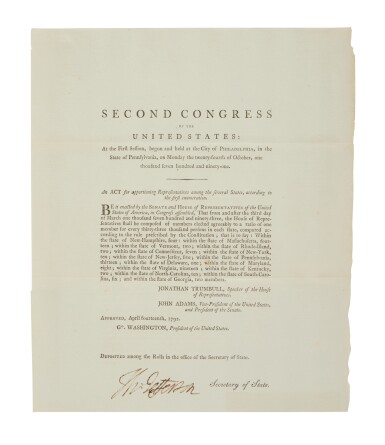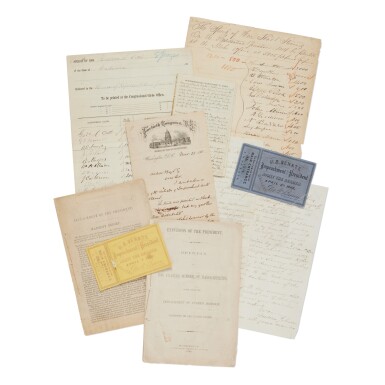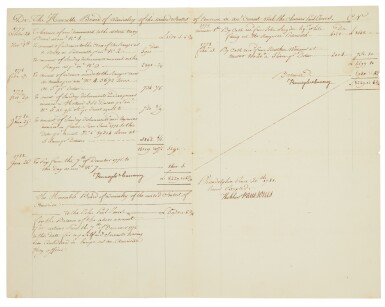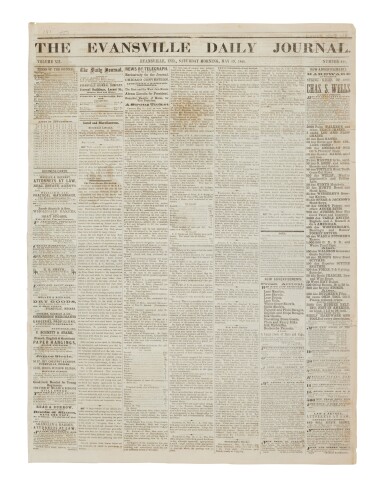Property of a New York Collector
André, JohnAutograph letter signed ("John André D. Adjt. Gen.") to Gregory Townsend, Esq., Assistant Commissary General of the British army, relaying Sir Henry Clinton’s authorization to purchase rum
One page (322 x 202 mm) on a bifolium (watermarked J Taylor | seated liberty), integral address leaf in André's hand, with recipient's docket ("Major Andre 19th Feby | 1780 Recs. 24th"), Head Quarters [New York City], 19 Feb[ruary] 1780; seal tear and repair, pinholes at intersecting folds.
A rare war-time letter from British officer and spymaster John André Rare Book Hub records the sale of only two other autograph letters signed by André in the past quarter century. Following his arrival in America in 1774, John André quickly proved himself to be an officer of exceptional ability, collegial and efficient. After serving as an aide to Major General Charles Grey André was appointed to the post of Deputy Adjutant General to British commander-in-chief Sir Henry Clinton in October 1779, at just 28 years of age.
Benedict Arnold had first broached his treasonous overtures to Clinton in May or June 1779, when he found himself seriously in debt and resentful of an accusation that he used his military office for private gain. Over that summer, Arnold gave military information of the highest importance to Clinton: troop movements, troop strength, and disposition of supplies. Acting as the British Army's contact with Arnold, André proved adept at navigating the surreptitious communications and negotiations for the betrayal of West Point, infamously using the code names "Lothario" and "John Anderson" in his communications.
In this imposing letter, written just seven months before the discovery of his clandestine activities, André relays to the Assistant Commissary General of the British Army Sir Henry Clinton’s authorization to purchase rum for the troops: "The Commander in chief bids me inform you with respect to the Rum, that you are to make such an agreem't with the Owner as you think, considering Circumstances. Mr. Weir will approve."
A daily rum ration was a staple of the British army, as well as the navy, during the Revolutionary War. The importance of the rum allocation to the operation of the army is shown by André’s implication to Assistant Commissary General Townsend that his negotiated price will be approved by Daniel Weir, Commissary General of Stores and Provisions in America, regardless of the cost. "Officers and men of the British military, like most men during the eighteenth century, drank regularly and often heavily. … Officially, the men were entitled to an allowance of small, i.e., weak, beer but there is little evidence of it ever being regularly issued to troops in North America. … Rum was the major drink of the enlisted man. … During the American Revolutionary War (1776–83) each man was allowed a gill and a half [about six ounces] or a gill and a third of rum a day regardless of his duties, although extra allowances were issued under special circumstances (Curtis 1972: 91–92). The rum was generally issued in half rations diluted with three parts water" (E. Ann Smith "Drinking Practices and Glassware of the British Military, ca. 1755–85," in Northeast Historical Archaeology: Vol. 12 [1983], Article 7).
André was captured with incriminating papers from Arnold in his boots on 23 September 1780 by three militiamen as he tried to make his way through American lines to Tarrytown. Arnold learned of André's capture on the morning of the 25th and fled down river to the safety of the H.M.S. Vulture, just before General Washington arrived at Arnold's headquarters. André was taken by barge to Stony Point on the 28th. His trial took place on the 29th—the court martial that heard the case was headed by General Nathanael Greene and included the Marquis de Lafayette, Baron von Steuben, and William Alexander Lord Stirling—and he was condemned as a spy. André did not deny his actions, but he did maintain that he was acting as a soldier and not in the manner of a spy and, so, deserved the dignity of execution by firing squad. Despite these entreaties, André was executed by hanging on 2 October in Tappan.
PROVENANCE:The Elsie O. and Philip D. Sang Foundation (Sotheby Parke Bernet, 14 November 1978, lot 340) — Christie's New York, 3 December 2007, lot 100 (undesignated consignor)
Property of a New York Collector
André, JohnAutograph letter signed ("John André D. Adjt. Gen.") to Gregory Townsend, Esq., Assistant Commissary General of the British army, relaying Sir Henry Clinton’s authorization to purchase rum
One page (322 x 202 mm) on a bifolium (watermarked J Taylor | seated liberty), integral address leaf in André's hand, with recipient's docket ("Major Andre 19th Feby | 1780 Recs. 24th"), Head Quarters [New York City], 19 Feb[ruary] 1780; seal tear and repair, pinholes at intersecting folds.
A rare war-time letter from British officer and spymaster John André Rare Book Hub records the sale of only two other autograph letters signed by André in the past quarter century. Following his arrival in America in 1774, John André quickly proved himself to be an officer of exceptional ability, collegial and efficient. After serving as an aide to Major General Charles Grey André was appointed to the post of Deputy Adjutant General to British commander-in-chief Sir Henry Clinton in October 1779, at just 28 years of age.
Benedict Arnold had first broached his treasonous overtures to Clinton in May or June 1779, when he found himself seriously in debt and resentful of an accusation that he used his military office for private gain. Over that summer, Arnold gave military information of the highest importance to Clinton: troop movements, troop strength, and disposition of supplies. Acting as the British Army's contact with Arnold, André proved adept at navigating the surreptitious communications and negotiations for the betrayal of West Point, infamously using the code names "Lothario" and "John Anderson" in his communications.
In this imposing letter, written just seven months before the discovery of his clandestine activities, André relays to the Assistant Commissary General of the British Army Sir Henry Clinton’s authorization to purchase rum for the troops: "The Commander in chief bids me inform you with respect to the Rum, that you are to make such an agreem't with the Owner as you think, considering Circumstances. Mr. Weir will approve."
A daily rum ration was a staple of the British army, as well as the navy, during the Revolutionary War. The importance of the rum allocation to the operation of the army is shown by André’s implication to Assistant Commissary General Townsend that his negotiated price will be approved by Daniel Weir, Commissary General of Stores and Provisions in America, regardless of the cost. "Officers and men of the British military, like most men during the eighteenth century, drank regularly and often heavily. … Officially, the men were entitled to an allowance of small, i.e., weak, beer but there is little evidence of it ever being regularly issued to troops in North America. … Rum was the major drink of the enlisted man. … During the American Revolutionary War (1776–83) each man was allowed a gill and a half [about six ounces] or a gill and a third of rum a day regardless of his duties, although extra allowances were issued under special circumstances (Curtis 1972: 91–92). The rum was generally issued in half rations diluted with three parts water" (E. Ann Smith "Drinking Practices and Glassware of the British Military, ca. 1755–85," in Northeast Historical Archaeology: Vol. 12 [1983], Article 7).
André was captured with incriminating papers from Arnold in his boots on 23 September 1780 by three militiamen as he tried to make his way through American lines to Tarrytown. Arnold learned of André's capture on the morning of the 25th and fled down river to the safety of the H.M.S. Vulture, just before General Washington arrived at Arnold's headquarters. André was taken by barge to Stony Point on the 28th. His trial took place on the 29th—the court martial that heard the case was headed by General Nathanael Greene and included the Marquis de Lafayette, Baron von Steuben, and William Alexander Lord Stirling—and he was condemned as a spy. André did not deny his actions, but he did maintain that he was acting as a soldier and not in the manner of a spy and, so, deserved the dignity of execution by firing squad. Despite these entreaties, André was executed by hanging on 2 October in Tappan.
PROVENANCE:The Elsie O. and Philip D. Sang Foundation (Sotheby Parke Bernet, 14 November 1978, lot 340) — Christie's New York, 3 December 2007, lot 100 (undesignated consignor)















Testen Sie LotSearch und seine Premium-Features 7 Tage - ohne Kosten!
Lassen Sie sich automatisch über neue Objekte in kommenden Auktionen benachrichtigen.
Suchauftrag anlegen